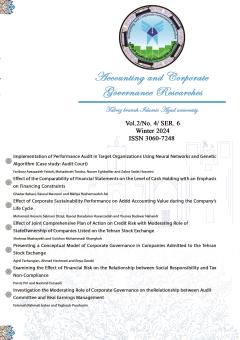Implementation of Performance audit in Target Institutions using Neural Networks and Genetic Algorithm (Case study: Audit Court)
Subject Areas : Financial accountingFariborz Avazzadeh Fattah 1 , Mohadeseh Tondro 2 , Nasser Eghbalifar 3 , Zahra Sadat Hosseini 4
1 - Assistant Prof, Department of Accounting, Gachsaran Branch, Islamic Azad University, Gachsaran, Iran
2 - Ph.D. Candidate in Accounting, Yasouj Branch, Islamic Azad University, Yasouj, Iran.
3 - Instructor, Department of Accounting, Yasouj Branch, Islamic Azad University, Yasouj, Iran
4 - Assistant Prof, Department of Accounting, Yasouj Branch, Islamic Azad University, Yasouj, Iran
Keywords: Performance audit, Audit court, Neural network, Genetic algorithm, Gray wolf.,
Abstract :
One of the major challenges of the performance audit is identifying the factors affecting the correct implementation and how these factors affect the operational process improvement of executive bodies. The current research aims to implement the performance audit in the Iran Audit Court. This research is applied. The present research has two communities. The first group comprises specialists and experts (audit organization auditors, Audit Court auditors, Audit Court accountants, and financial managers). The second community consists of National Audit Court employees and managers during the research period. In the first community, the snowball technique was used to determine the sample size, and 14 people were selected based on the principle of information saturation. In the second community, the convenience sampling method was used to determine the sample size using Cochran's formula (n=315). Eight effective factors in implementing performance audit in the National Audit Court were identified based on the theoretical basis. Regarding the Delphi-phase type 3 approach, the identified factors were confirmed. Then, 18 neural network, genetics, heuristic, and meta-heuristic approaches were investigated to investigate the effect of the effective factors on the implementation of performance audits in the National Audit Court. The gray wolf approach was more accurate than other methods. According to the results of the gray wolf method, infrastructure variables (0.3440); efficiency (0.1849); effectiveness (0.1134); economic efficiency (0.2947); cultivation (0.3657); specialist human resources (0.5984); organization performance (0.4609); management and leadership (0.6804) have a positive and significant effect on the implementation of performance audit.


